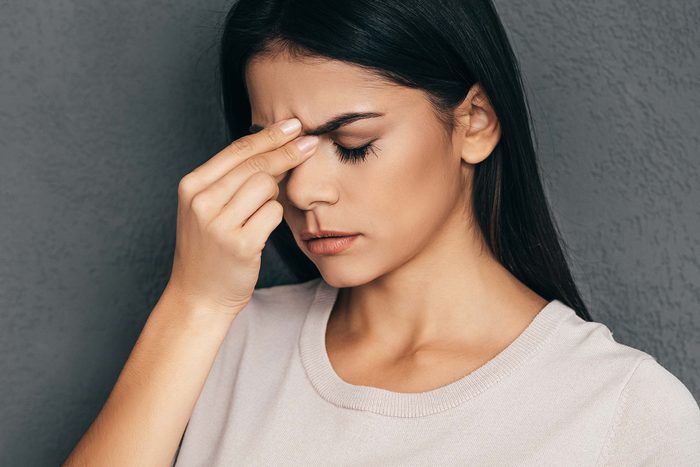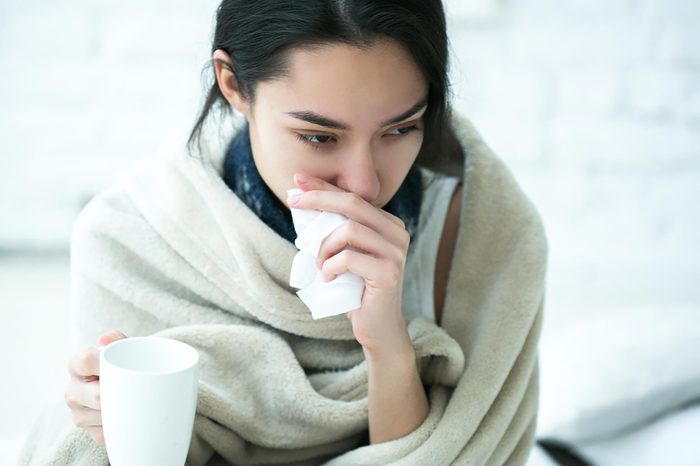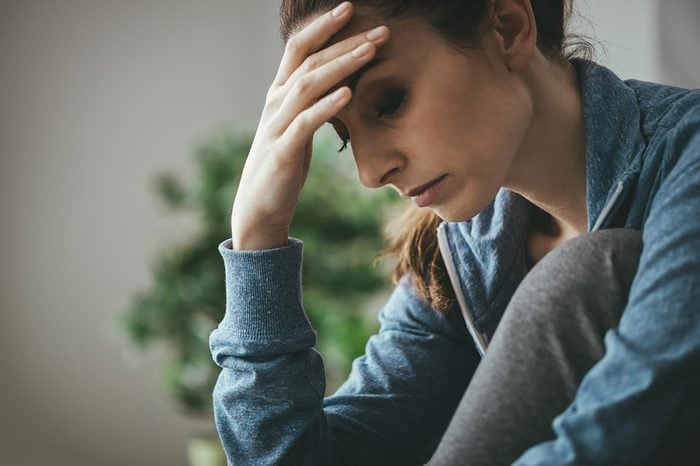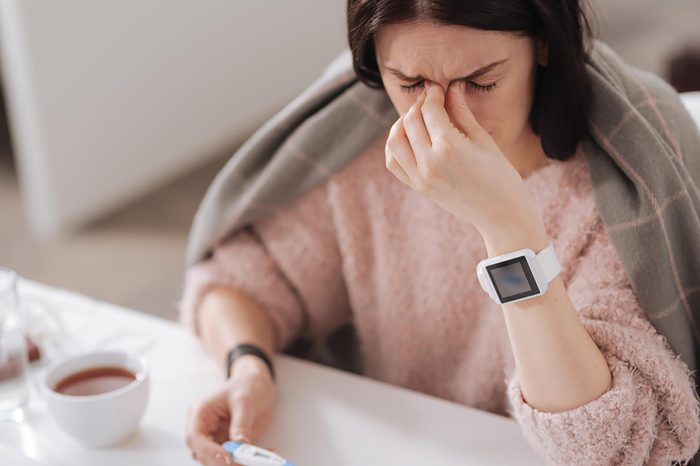
Subtle cold symptoms
A sore throat, coughing, and more snot than you knew could exist in a human body—you’re likely already very familiar with the obvious ways your body responds to the cold virus. After all, nearly every adult can expect to get two to three colds every year, according to the Centers for Disease Control and Prevention (CDC). But the cold virus affects more than just your respiratory system; you might be surprised to discover how much is really going on behind the scenes when you’re sick.

You’re in a funk
“Whenever there’s an infection in the body, your body releases proteins, called cytokines, to help the body fight the infection,” says Partha Nandi, MD, author of Ask Dr. Nandi: 5 Steps to Becoming Your Own #HealthHero for Longevity, Well-Being, and a Joyful Life. “That happens whether you have a common cold or a more serious infection, like the flu.” Knowing the nine clear signs that a cold is coming on will help you spot trouble in advance.
But while the cytokines are helping you get better, they also cause another side effect: A depressed mood. “When you’re sick, you feel like, ‘Leave me alone; I don’t want to deal with anyone.’ It’s not because you are unique, it’s because of the chemicals being produced,” Dr. Nandi says.
“An illness does affect mood, performance, and alertness,” says Mary Alvord, PhD, a licensed psychologist in Rockville, Maryland. Don’t beat yourself up for feeling down, she suggests. “Understand that this is a very specific situation. Tell yourself, ‘I have a cold, and it’s right now, it’s temporary. This won’t go on for very long,'” says Alvord. Make sure you don’t have an underlying condition your irritability is signaling.

You’re exhausted
Cytokines have a positive impact on healing your body but they can leave you feeling lethargic, says Dr. Nandi. Your sleep pattern may even change. When you’re sick, make sure you’re getting as much sleep as possible so your body can fight the infection faster, he suggests. “In order to recover your body needs more rest than normal to repair itself,” he says. Here are 13 secrets from sleep doctors that will help you sleep better.
You can also get cold-induced insomnia. “When you can’t breathe well, you can’t sleep as well,” says Alvord. “When you can’t sleep as well, we know that it affects your mood and alertness. Sleep-deprived people tend to be grouchier, and their frustration tolerance is lower.”

You cancel plans
Your body doesn’t want to do anything else other than tackle the virus. It’s how we survive, says Dr. Nandi: Your body is focused on fighting the infection—not in making you feel better in the moment. If you decide to ignore your bad cold and try to live life with your normal routine, the cold can have even more of a negative impact on your physical and psychological state, she explains.
While it’s probably a good idea to scale back on your social plans and outings when you’re sick, don’t completely isolate yourself, suggests Dr. Alvord. “Reach out for social support so you have perspective on whatever else is going on. When you’re isolated, you lose that perspective.” Keep your germs to yourself by keeping up with friends and family via social media or video calls if you live alone. Here’s how to make a cold less miserable.

You’re anti-social
When you’re sick, you may not want to talk to anyone. But people with more friends catch fewer colds, according to a study published in JAMA. Interestingly, the social aspects of parenting may help as well: Parents are 50 percent less likely to catch a cold than peers without kids, according to a study published in Psychosomatic Medicine. “People who are more positive draw more people to them,” says Dr. Alvord. It’s good to get social support when you’re sick, she says. “Those who feel negative avoid or even drive off people, and don’t have as much social support,” she says, commenting on the research. Here’s how to make friends as an adult.

You can’t concentrate
Cytokines interfere with concentration, says Dr. Nandi, which makes these tips for improving your focus vital. “It’s a primitive response. When you are attacked with a bug, your body shuts down. It’s using every bit of energy to fight the infection.”
In a study of 200 people, published in Brain, Behavior, and Immunity, researchers found that those with colds had diminished alertness, a negative mood, and psychomotor slowing—their thought process was muddied and their reaction times were slower compared to healthy folks. The cold sufferers took longer to understand and learn new information, according to the study.

You feel depressed
Brain inflammation is linked with depression, according to a study published in JAMA Psychiatry. “When you have inflammation, like the kind caused by a cold, it can make you feel depressed,” says Dr. Nandi. And if you are already clinically depressed, a cold can make your mood even worse, he explains.
“Many people who are depressed want to crawl into bed and sleep,” says Alvord. “But that’s the opposite of what we want depressed people to do. We want to get them more behaviorally activated. They feel more justified to sleep when depressed, and that can take them out of activity and further isolate them. That’s a ripple effect,” she says.

Your Rx to feel better faster
“Nutrition is so important when you’re sick—if you don’t eat well when you’re ill, it could slow down your healing,” says Dr. Nandi. “You’re in an inflamed state throughout your body and adding inflammation by eating foods that have a lot of additives, preservatives, and sugar can cause further inflammation.” You can start with 10 of the healthiest vegetables you can eat.
In addition to eating healthy, whole foods, Dr. Nandi also suggests you drink more water. “You’re losing fluids while trying to fight this bug, so drink more than you normally would. All of the energy you’re using to fight this infection dehydrates you,” he says.
Give yourself a break when you have a cold, suggests Alvord. Tell yourself, “I may not be getting as much sleep as I should, and I might feel down. I need to take care of myself.” Consider pampering yourself a little bit and let others do the same, she says. Check out these face masks you can make yourself for at-home pampering.

